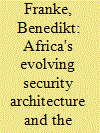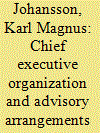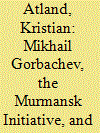| Srl | Item |
| 1 |
ID:
083439


|
|
|
|
|
| Publication |
2008.
|
| Summary/Abstract |
Following decades of feeble attempts, Africa's states have recently made great strides in establishing an elaborate security architecture to tackle the continent's many perils. I argue that the emergence and particular structure of this architecture and its institutional layers are best described by the constructivist concept of multilayered security communities. While this concept is based on the original idea of security communities by Karl Deutsch and its later adaptation by Emmanuel Adler and Michael Barnett, it recognizes the increasing prominence of elaborate multi-level security cooperation in the developing world and the difficulties of the original theoretical framework to account therefor. Consequently, it combines security community terminology with notions such as organized complementarity and multi-level governance to do conceptual justice to systems like Africa's decentralized collective security arrangement.
|
|
|
|
|
|
|
|
|
|
|
|
|
|
|
|
| 2 |
ID:
083437


|
|
|
|
|
| Publication |
2008.
|
| Summary/Abstract |
As prime ministers are drawn into international relations and the foreign policy process, they are in need of advisory structures for foreign affairs in their offices. This article examines the system and the role of foreign affairs advisers to the Prime Minister (PM), the chief executive, in Sweden. The article centres on the organization for foreign affairs, in general terms of institutional and staffing arrangements, and on leader-adviser relationships. As the right hand of the PM, inner circle advisers in foreign affairs have a direct role in overseeing foreign policy on the key issues and do more than just serve in an advisory capacity by being operative in diplomacy and in policy coordination. These advisers can therefore wield influence on policy and the government based on their own expertise and position at the centre of power and at the frontier between the chief executive and the outside world
|
|
|
|
|
|
|
|
|
|
|
|
|
|
|
|
| 3 |
ID:
083438


|
|
|
|
|
| Publication |
2008.
|
| Summary/Abstract |
In October 1987, during a visit to the Kola Peninsula, the Secretary-General of the Soviet Communist Party, Mikhail Gorbachev, launched a series of policy initiatives which ultimately came to mark the beginning of the end of the Cold War era in the Arctic. The move was aimed at transforming the northern part of the globe from being a sensitive military theatre to becoming an international `zone of peace'. This objective was to be achieved through the establishment of a nuclear weapons-free zone in Northern Europe, restrictions on naval activities in Arctic seas, and the development of transborder cooperation in areas such as resource development, scientific exploration, indigenous people's affairs, environmental protection and marine transportation. This article analyses the contents of the Murmansk initiative, the context in which it was launched, the extent to which it materialized, and the degree to which it contributed to a normalization of interstate relations in the Arctic. In addition to being motivated by historical interest, the article aims at exploring the Copenhagen School concept of `desecuritization' and shedding light on the challenges and opportunities of turning security issues into non-security issues.
|
|
|
|
|
|
|
|
|
|
|
|
|
|
|
|